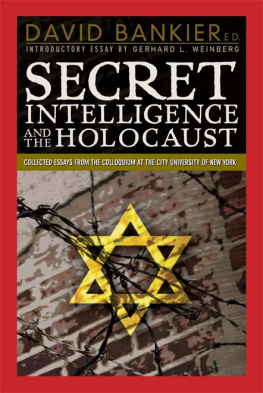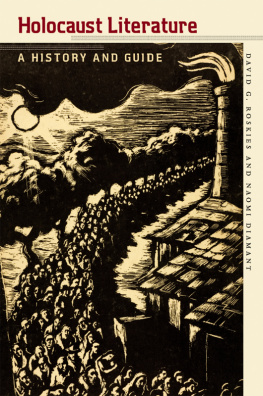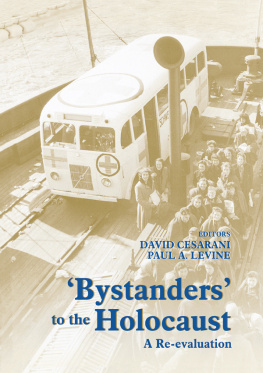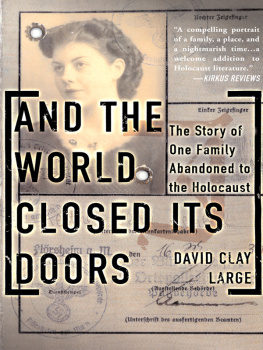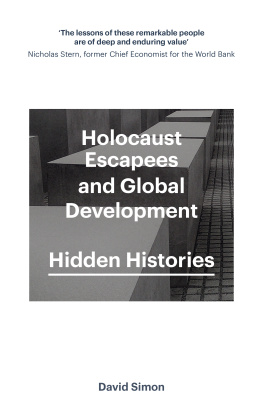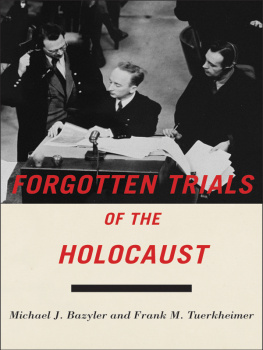SECRET
INTELLIGENCE
AND
THE HOLOCAUST
Edited by
David Bankier
Collected Essays from the Colloquium at
THE CITY UNIVERSITY OF NEW YORK
GRADUATE CENTER
ENIGMA BOOKS Yad Vashem
New York Jerusalem
The responsibility for the views expressed in this publication rests solely with the authors.
All rights reserved. No part of this publication may be reproduced in any form or by any means, electronic or mechanical, including photocopy, recording or any information storage or retrieval system, without permission in writing from the publisher Yad Vashem The Holocaust Martyrs and Heroes Remembrance Authority.
The Conference was sponsored by The Emmanuel Sella Family Foundation, the U.S. Holocaust Memorial Museum, The Museum of Jewish Heritage, Yad Vashem, and the Graduate Center of CUNY.
Copyright 2006 by Yad Vashem, Jerusalem
Published in association with
ENIGMA BOOKS, New York
www.enigmabooks.com
First Printing 2006
ISBN 1-929631-60-X
Library of Congress Cataloging-in-Publication Data
Colloquium on secret intelligence and the Holocaust (2003 : City University of New York)
Secret intelligence and the Holocaust / edited by David Bankier.
p. : ill. ; cm.
ISBN: 1-929631-60-X
Includes index.
1. Holocaust, Jewish (1939-1945)--Congresses. 2. World War, 1939-1945--Secret service-United States--Congresses. 3. World War, 1939-1945--Secret service--France--Congresses. 4. World War, 1939-1945--Secret service-Great Britain-Congresses. 5. World War, 1939-1945--Military intelligence--Congresses. I. Bankier, David. II. City University of New York. Graduate School and University Center. III. Emmanuel Sella Family Foundation. IV. U.S. Holocaust Memorial Museum. V. Museum of Jewish Heritage (New York, N. Y.) VI. Yad va-shem, rashut ha-zikaron la-Shoah vela-gevurah.
D810.S7 C65 2006
940.54/86
Table of Contents
This publication was made possible due to the efforts of the members of the Conference Planning Group under the Chairmanship of Professor Gerhard L. Weinberg, of the Center for Advanced Holocaust Studies at the United States Holocaust Memorial Museum directed by Dr. Paul A. Shapiro, and to the dedication of its lay leader, the late Emmanuel Sella, one of its main supporters, and of the late Professor Egon Mayer of CUNY.
Emmanuel Sella was the driving force behind the conference whose fruits fill the following pages. His death prior to the present publication has left us deeply bereaved. Not only was he the father of the conference in the practical sense, but also its guiding light and a symbol for us. Daily contact with him bequeathed to us a commitment to pursue the values he symbolized and the inspiration he radiated. He was a man of a wide-range of commitments who never forgot his background. He left Poland when only a boy, inspired by the call of the Betar Movement (a right wing Zionist group), and made his way to Palestine across unimaginably difficult terrain, and grew up on kibbutzim affiliated with the social-democratic Labor Movement. Throughout his lifetime in Israel and in New York City he bore the lessons he learned from the tribulations of his youth and retained his faith in man even when faced with the loss of his family and the abominations of the Holocaust.
Despite the horrors he witnessed as a youth and which remained with him as silent, bleeding wounds, he radiated engaging charm, loving kindness, moral support, and endless creative energy. Emmanuel felt that the widespread distribution of the conferences results would have lasting influence. They will come to listen. They will learn, and they will internalize the lessons, not just for themselves, but for the coming generations. In this spirit he created an institutional link and personal friendship with the Archivist of the United States Mr. John Carlin. The American archivist too was personally saddened by Emmanuel Sellas untimely death just when the declassification of Nazi-related files was being implemented thanks to the 1998 Nazi War Crimes and Imperial Japanese Records Disclosure Act by an Inter Agency Working Group, several among its collaborators are contributors to this volume. Along with Emmanuels family and many friends, we mourn his passing, and remain committed to the legacy, greatness, and vision of this outstanding Israeli.
Egon Mayer, a distinguished sociologist at CUNY, was himself a Holocaust survivor. Born in Hungary, he was one of the few who were rescued thanks to the efforts of Dr. Rezs Kasztner, whose dealing with the Nazis after the occupation of Hungary in March 1944 and other rescue efforts are discussed in this volume. Egon dedicated years of research to clarify the Kasztner case, and joined the Planning Group of the CUNY Conference with all his charm, energy and knowledge, when approached by us. He served as our link to CUNY before, during and after the conference, whose papers are published here. He died prematurely. May these pages serve as a memorial to his great effort in making their publication possible.
In addition, we wish to thank the Sella Foundation, the United States Holocaust Memorial Museum, and the New York Museum of Jewish Heritage for the financial support of the Conference; the Claims Conference for providing backup financial support in case it turned out to be needed; and the Graduate School of CUNY for making its facilities available.
The members of the Conferences Planning Group, Professor Gerhard L. Weinberg professor emeritus of the University of North Carolina-Chapel Hill; Professor Richard Breitman of the American University; Dr. Greg Bradsher of the United States National Archives and Records Administration; Professor Wesley K. Wark of the University of Toronto; Dr. Paul A. Shapiro of the Center of Advanced Holocaust Studies, United States Holocaust Memorial Museum; and myself as Academic Secretary of the CUNY Conference, are very much indebted to Professor David Bankier whose patience and efforts as editor of the present volume have made its publication by Yad Vashem and Enigma Book possible.
Shlomo Aronson
Hebrew University, Jerusalem, July 2005
After the end of the Second World War, the British and American governments did not release the intelligence material they had on Nazi Germanys extermination policy of European Jewry, especially the documents collected from the de-coding operations. Although such material could have assisted the prosecution cases in the trials of Nazi criminals, national interests in the cold war period were more important.
The first publications that discussed intelligence information in connection with the Holocaust were Walter Laqueurs The Terrible Secret, published in 1980 and Harry Hinsleys second volume of British Intelligence in the Second World War, published a year later. Laqueurs study tracked the knowledge of the Holocaust among the Allied governments, the leaders of the international Jewish organizations, neutral countries, the International Red Cross and the German population. Hinsleys book contained an appendix on the police decodes, which portrayed the operations of the Einsatzgruppen and police units on the Eastern Front and the SS communications about the concentration camps. While Hinsley, as the official historian of British intelligence, was given access to classified records, the sources he cited remained closed to other scholars for the next fifteen years.
In the last decade London and Washington have been lifting the legal and bureaucratic obstacles regarding access to intelligence files. Records of decrypted German Order Police communications were declassified in May 1997. In addition, more than eight million documents in secret government files have been declassified since 1999 under the US Nazi War Crimes Disclosure Act. This shift in archival policy brought to light previously inaccessible documents and enabled historians fill in many blanks in the historical narrative. The released documentary evidence assisted the investigators in identifying units and personnel involved in genocidal activities. Scholars could now refine their answers to basic questions related to the Holocaust. Who in Allied governments knew what about the Holocaust and when? What did the West know about the onset of the Holocaust? Why did the British and American governments fail to bring the information to the early attention of the public? Could a military response, or a propaganda campaign against Nazi atrocities have interrupted the deportations or mass extermination in Auschwitz?

